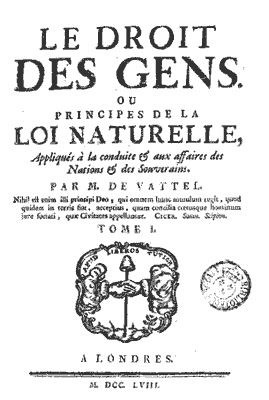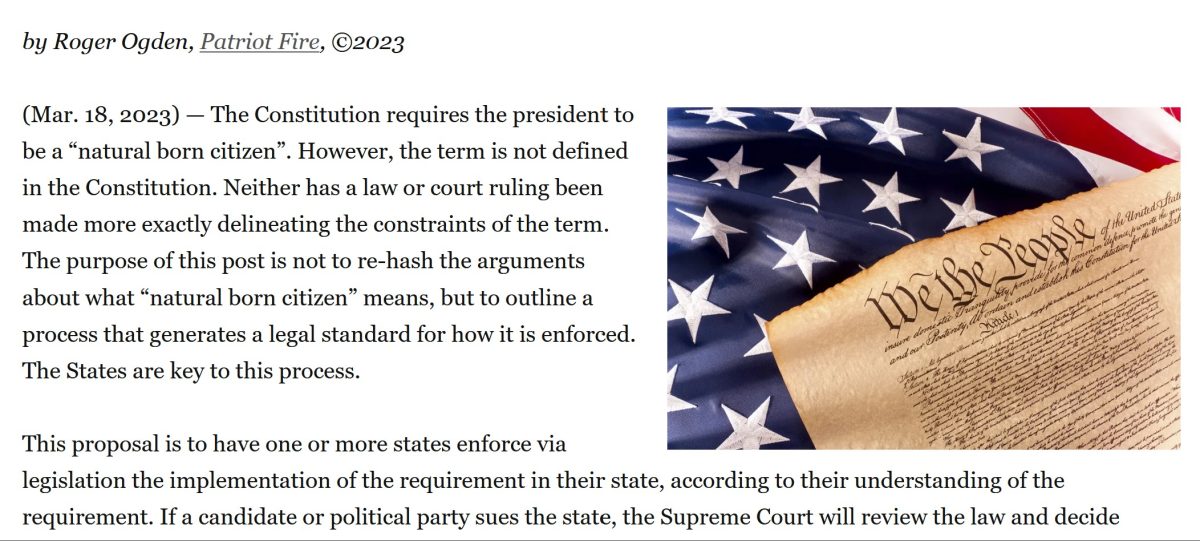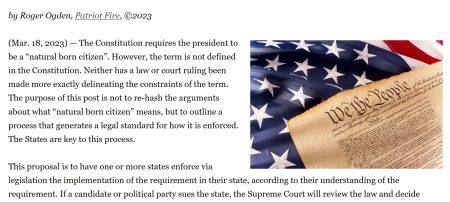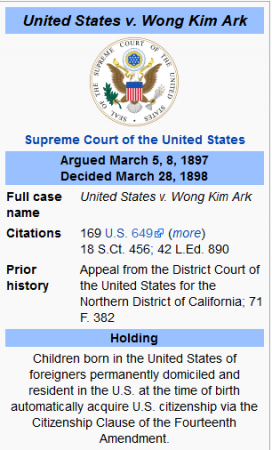by Joseph DeMaio, ©2023
(Mar. 20, 2023) — Recently there appeared here at The P&E – one of the few remaining viable and non-censored Internet “natural born Citizen” information sources – a particularly relevant and insightful post. The P&E post reprised the article and substance of a proposal advanced here by one Roger Ogden. Mr. Ogden, in turn, properly acknowledged the origins of the argument by eligibility guru Mario Apuzzo, Esq. – lamentably, passing away at age 65 on October 10, 2021 – and first advanced by him back in March 2011. That post by Mr. Apuzzo from 2011, by the way, should first be perused by anyone interested in the proposal now being advanced in 2023 by Mr. Ogden.
The essence of the current proposal is quite simple: the states have the power under the Constitution’s “Elections Clause,” Art. 1, § 4, Cl., 1 to enact laws of their own setting forth the requirements of a presidential candidate to qualify for inclusion on a primary or general election ballot. Under that power, states would be able to adopt, in their own jurisdictions if they so chose, the definition of a “natural born Citizen” (“nbC”) articulated in § 212 of Emmerich de Vattel’s 1758 treatise “Le Droit des Gens,” or “The Law of Nations.” This provision, of course, is believed by many to be the source for John Jay’s noted July 25, 1787 letter to George Washington “hinting” at the wisdom of restricting the presidency exclusively to a “natural born Citizen.” (Emphasis Jay’s)

Thus, a “red” state could then prescribe that a presidential candidate must adduce competent evidence that the candidate is a nbC as posited by de Vattel – born on U.S. soil to two parents who are already U.S. citizens – as discussed among many other places here, here and here.
On the other hand, a different “blue” (or even purple) state might enact a statute adopting the “Wong Kim Ark” (“WKA”) theory mandating a definition stating that mere birth alone here – and under some variations on the theme, birth, for example say, in Canada or Panama – and regardless of parental citizenship, would be enough to render the person a nbC.
Clearly, this dichotomy would (or at minimum, should) present a wealth of opportunities for opposing litigants in either the red state, the blue state or the purple state to file suit challenging the constitutionality of the respective statutes. For ease of reference here, let us give these species of statutes an acronym: “POPE” or “Proof of Presidential Eligibility” statutes.
In addition to providing an avenue to challenge a POPE law before the Supreme Court by a private party in a state that had enacted a statute requiring, in order to appear on the ballot, documentation of a candidate’s presidential eligibility articulated under either a de Vattel § 212 definition of a nbC or, alternatively, a “Wong Kim Ark” or “WKA” definition, another potential option exists.
Specifically, in order to avoid “standing” issues which could otherwise complicate challenges to either of such species of POPE statutes by private litigants, original jurisdiction in the Supreme Court – obviating questions of private litigant standing – may be found in Art. 3, § 2, Cl. 5: “The judicial Power [of the Supreme Court] shall extend… to Controversies between two or more States….”
Under this provision, if red state “A” enacted a de Vattel POPE statute and blue or purple state “B” enacted a “WKA” POPE statute, clearly, the Supreme Court would have original “Elections Clause” jurisdiction to take a case challenging one or both of those statutes. Whether it would finally do so – abandoning its “evasive” history on the issue – is of course another question. The Court could, for example, simply decline to take the case on the grounds that it constituted a “political question” or involved a problematic “separation of powers” issue. Anyone who still believes that the Supreme Court is not influenced by politics needs professional help.
A refusal by the Court to take jurisdiction in such cases, of course, would only further compound the confusion. While it is difficult to see, beyond the politics, why the Court would decline to take such a case, at minimum, it would again present a perfect opportunity for one or more of the Justices to prepare a separate “Opinion Relating to Orders” explaining their positions either supporting (or refusing) jurisdiction and, finally, hopefully producing some tangible, but not binding or precedential authority, on what the Founders – as opposed to those who were not among the Founders–intended.
But for some practical impediments, the idea makes a lot of sense: if the Congress refuses to act by way of proposing a constitutional amendment; if the Supreme Court continues to “evade” the issue as being too controversial – as if the overruling of Roe v. Wade was not –; and the electorate is otherwise too preoccupied with the serial disasters dumped upon them by Brandon’s Regime, perhaps the time has come to try something different.
However, there are some complicating issues that need to be addressed. As Mr. Apuzzo pointed out in his 2011 post, a lawyer at the Congressional Research Service (“CRS”), one Jack Maskell, had addressed these issues in a memorandum issued on April 3, 2009. That CRS memorandum contains a number of citations to appellate case decisions which must be taken into consideration as impacting the proposal for state action on the nbC eligibility issue.
It is also the CRS memorandum dissected here, here and here regarding the ellipsis alteration of quoted Supreme Court language from its decision in Perkins v. Elg, 307 U.S. 325 (1939), facilitating a “conclusion” that Barack Hussein Obama, Jr. was a constitutionally-eligible nbC. Respectfully, a pretty good argument exists that he was not.
But I digress.
Mr. Apuzzo, quoting Mr. Maskell’s memorandum, notes that the decision in Storer v. Brown, 415 U.S. 724, 730 (1974) holds that “the States have evolved comprehensive, and in many respects complex, election codes regulating in most substantial ways, with respect to both federal and state elections, the time, place, and manner of holding primary and general elections, the registration and qualifications of voters, and the selection and qualification of candidates.” (Emphasis added).
Assuming that Mr. Maskell equated the term “qualification” with the term “eligibility,” it would seem clear that he was acknowledging that states – red, blue or purple – could enact laws regarding that particular state’s adoption of whatever it believed constituted a “natural born Citizen.” As long as the state law did not define a nbC in a way that contravened the actual words of the Constitution, it should be validated.
But since the Constitution itself does not define the term, the next best place to look would be – no surprise here – decisions of the Supreme Court on or sufficiently close to the issue of its definition. As consistently argued by Mr. Apuzzo as well as by many others, including your humble servant, perhaps the leading Supreme Court case addressing the issue is Minor v. Happersett, 88 U.S. 162 (1875). There, the Court stated that the term “natural born citizen” was understood by the Founders to mean that which de Vattel posited: – a person born on U.S. soil to two parents who are already U.S. citizens.
Any state that enacted a POPE statute based on the definitions of de Vattel and adopted in Minor could hardly be seen as “changing” a nonexistent definition of the nbC term in the Constitution. Accordingly, that would be a case where the Supreme Court could accept jurisdiction, but, in your humble servant’s opinion, should – if not “must” – accept jurisdiction.
Stated otherwise, the suggestion made at The P&E and here that the states should take up the challenge where the Supreme Court has refused merits serious consideration. Kudos go out to Mr. Ogden and posthumous thanks as well to Mario Apuzzo. The problem, of course, will be to find those states with a legislature and governor willing to take these steps, thereby eliminating perhaps as many as fully one-half – or more – of the states in the Union.
No one ever claimed that “keeping the Republic” would be easy, and Ben Franklin even suggested that it might be difficult.
The guy was prescient.






Excellent research and work by both Roger Ogden and Joseph DeMaio. Bravo Zulu!
And thank you both for the kind words for my attorney Mario Apuzzo who filed the Kerchner et al vs Obama and Congress et al lawsuit which was filed early in the a.m. of January 20th, 2009 and who eventual took it for me to the U.S. Supreme Court. As we know it was turned away and evaded by the federal courts for lack of standing instead of taking the case to decide once and for all a very important national security term in the presidential eligibility clause of our U.S. Constitution, i.e., “natural born Citizen” (NBC). In my opinion it was the duty to take on this issue as a first impression case to decide what NBC means as explicity applied to who can serve as President and Commander in Chief of our military. I believe that means a person born with unity of Citizenship and Sole Allegiance to the USA at birth. Dual-Citizens are not eligible.
Here is a table of contents that I created for those wanting to peruse the lawsuit and with links to some of the subsequent filings. Taking on the issue was evaded by the federal courts using the lack of standing tactic. In my opinion they (and especially Chief Justice John Roberts) were just politically motivated and afraid to do so due to all the racist charges and early cancel culture threats being thrown around towards anyone challenging Obama: https://www.scribd.com/document/61221761/Kerchner-v-Obama-Congress-DOC-00-Table-of-Contents-for-2nd-Amended-Complaint
Here is a link to a white paper I wrote several years ago which answers all the Who, What, When, Where, WHY, and How questions about the “natural born Citizen” clause in our U.S. Constitution: http://www.kerchner.com/protectourliberty/naturalborncitizen/TheWhoWhatWhenWhereWhyandHowofNBC-WhitePaper.pdf
Again, BRAVO ZULU to Roger Ogden and Joseph DeMaio for their excellent research and articles.
CDR Charles Kerchner (Ret)
http://www.ProtectOurLiberty.org
I actually thought of it while reading about states defining “male” and “female” in order to counter the transgender mania. I thought, then why can’t the states also define “natural born citizen”. I started a post and then discovered that Mario Apuzzo had already written a much more detailed analysis in 2011. There are no new ideas, I guess, but sometimes there are ideas whose time has come and can be dusted off.
Nice article.
Article One, Section Four applies only to federal congressional elections.
https://en.wikipedia.org/wiki/National_Monument_to_the_Forefathers
The author appears to ignore the current case law. A number of state courts have already ruled on this question and they all appear to read US v. Wong Kim Ark (1898) as authoritative if not binding precedent. Would any legislative attempt to override these decisions be ruled unconstitutional?
In a previous comment I pointed out that even Professor Titus (a two-citizen parent advocate) recognized that Wong Kim Ark (not Minor) is the precedent which controls this issue. In his amicus brief in Rudy v Lee (2014-1056) Professor Titus does not rely on Minor v Happersett as a precedent but rather points out that the choice is between Justice Gray’s opinion or Chief Justice Fuller’s dissent in Wong Kim Ark. It is clear from his argument that he recognized that even though Justice Gray did not specifically declare Wong a natural born citizen the effect of the decision made him eligible to be president.
https://www.thepostemail.com/2023/03/08/the-natural-born-question-will-it-be-answered/#comment-436108
Professor Titus amicus brief (Rudy v Lee)
http://cldef.org/briefs/Rudy%20v%20Lee%20USJF%20Amicus%20Brief.pdf
Supreme Court docket (Rudy v Lee)
https://www.supremecourt.gov/search.aspx?filename=/docketfiles/14-36.htm
There are two cases that should be read as both influenced Justice Gray’s opinion and are cited by him.
Lynch v Clarke 1844 New York Chancery Reports
“6. Upon principle, therefore, I can entertain no doubt, but that by the law of the United States, every person born within the dominions and allegiance of the United States, whatever were the situation of his parents, is a natural born citizen.”
https://cite.case.law/pdf/2163616/Lynch%20v.%20Clarke,%201%20Sand.%20Ch.%20583%20(1844).pdf
In re look Tin Sing 21 F. 905 (D.Cal. 1884)
Citing Lynch v Clarke – “It was held that she was a citizen of the United States. After an exhaustive examination of the law, the vice-chancellor said that he entertained no doubt that every person born within the dominions and allegiance of the United States, whatever the situation of his parents, was a natural-born citizen; and added that this was the general understanding of the legal profession, and the universal impression of the public mind.”
https://casetext.com/case/in-re-look-tin-sing
The author of the opinion in Look Tin Sing with Justice Stephan Field who was also on the Court for the Minor v Happersett decision.
After so many years of comments and learned nbC dissertations it appears the solution has been hiding in plain sight. The only question in my mind is, will the decision makers step up and do their job? If it comes down to “we the people” doing it for them it may not be pretty.
Or, Change OUR Country’s Name To “STATES OF AMERICA”, Because We Certainly Are No Longer UNITED!
When Crystal Clear Just Isn’t Clear Enough For The Whiners, Societies Weaklings Change The Meanings Of Century Old Words, Concise Laws, And Yes Even Erase Inconvenient History!
After 77 Years Of Fighting For The RIGHT, I Say FORGET IT! I’m Done! It’s The Spineless Turn! You Chose This This Mess Without A Fight!